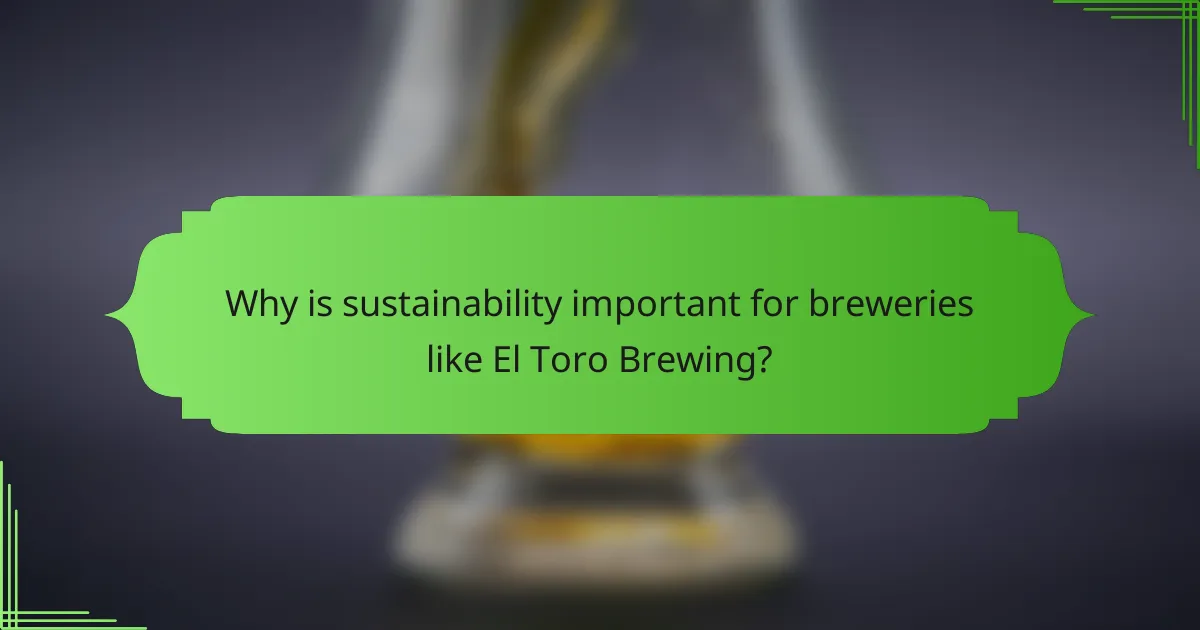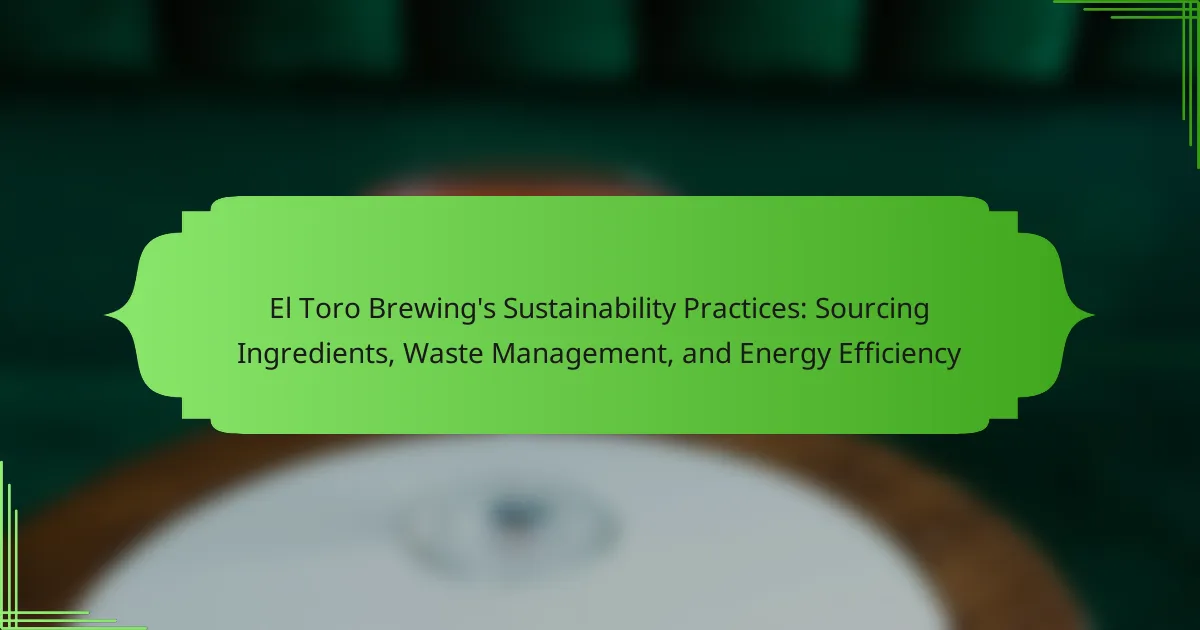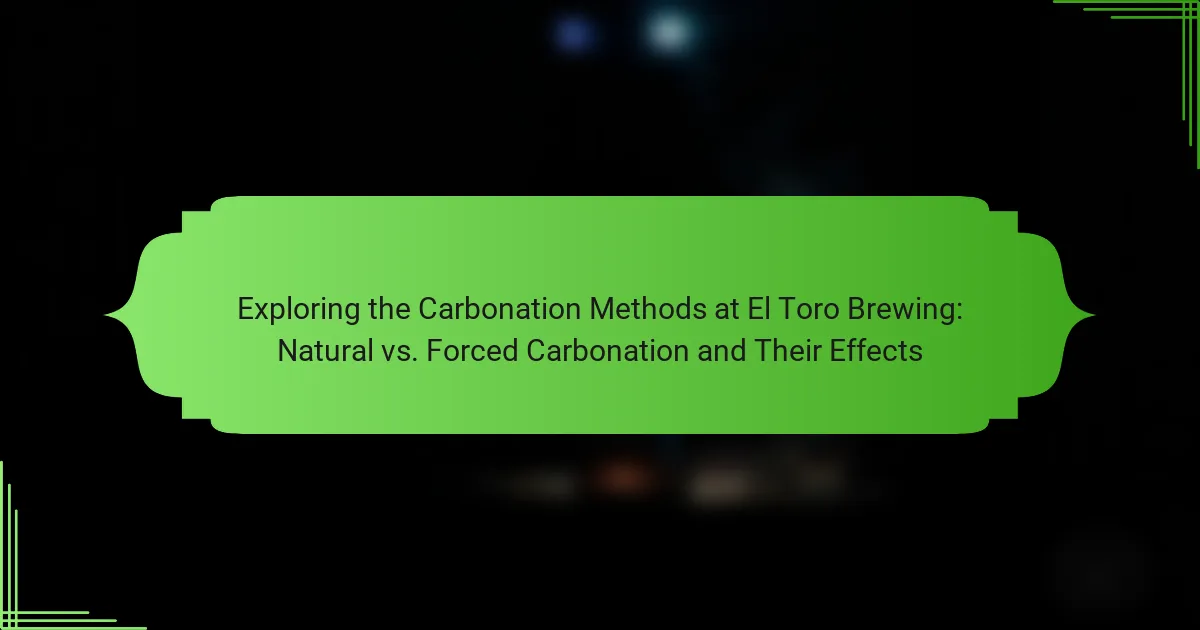El Toro Brewing is a brewery that implements sustainability practices focused on sourcing ingredients, waste management, and energy efficiency. The brewery prioritizes local sourcing to reduce transportation emissions, supporting regional agriculture and enhancing product freshness. El Toro Brewing employs a comprehensive waste management system that includes recycling and composting, minimizing landfill contributions. Additionally, the use of energy-efficient equipment, such as LED lighting and advanced brewing systems, contributes to a lower carbon footprint. These initiatives not only reduce environmental impact but also improve operational efficiency and enhance brand reputation among eco-conscious consumers. Other breweries can adopt similar strategies to achieve significant sustainability improvements in the brewing industry.

What are El Toro Brewing’s sustainability practices?
El Toro Brewing implements several sustainability practices focused on sourcing ingredients, waste management, and energy efficiency. They prioritize local sourcing for their ingredients to reduce transportation emissions. This practice supports local farmers and promotes regional agriculture. El Toro Brewing also employs a comprehensive waste management system. They recycle and compost a significant portion of their waste, minimizing landfill contributions. Additionally, the brewery utilizes energy-efficient equipment and technologies. This includes LED lighting and energy-efficient brewing systems. These initiatives collectively contribute to a lower carbon footprint and promote environmental stewardship.
How does El Toro Brewing source its ingredients sustainably?
El Toro Brewing sources its ingredients sustainably by prioritizing local suppliers. This reduces transportation emissions and supports the local economy. The brewery uses organic ingredients whenever possible. Organic farming practices minimize chemical use and promote biodiversity. Additionally, El Toro Brewing engages in sustainable farming partnerships. These partnerships ensure that ingredients are grown using eco-friendly methods. The brewery also emphasizes seasonal sourcing. This approach aligns ingredient availability with natural growing cycles. By implementing these practices, El Toro Brewing demonstrates its commitment to sustainability in ingredient sourcing.
What criteria does El Toro Brewing use for ingredient selection?
El Toro Brewing selects ingredients based on quality, sustainability, and local sourcing. They prioritize high-quality ingredients to ensure superior taste and flavor. Sustainability is a key factor, with a focus on environmentally friendly practices. Local sourcing supports regional farmers and reduces carbon footprint. These criteria align with their commitment to sustainability and community support.
How does local sourcing impact El Toro Brewing’s sustainability efforts?
Local sourcing significantly enhances El Toro Brewing’s sustainability efforts. It reduces transportation emissions by minimizing the distance ingredients travel. This practice supports local economies by fostering relationships with nearby farmers and suppliers. Local sourcing also ensures fresher ingredients, which can improve product quality. Furthermore, it encourages sustainable agricultural practices among local producers. By prioritizing local suppliers, El Toro Brewing lowers its carbon footprint. This commitment aligns with broader sustainability goals, such as reducing waste and promoting environmental stewardship. Overall, local sourcing is a key component of El Toro Brewing’s sustainable business model.
What waste management strategies does El Toro Brewing implement?
El Toro Brewing implements several waste management strategies to minimize its environmental impact. The brewery focuses on recycling and composting to divert waste from landfills. They also utilize spent grains as animal feed, reducing food waste. Additionally, El Toro Brewing engages in responsible sourcing to ensure minimal packaging waste. Their efforts include working with suppliers who prioritize sustainable practices. These strategies contribute to a circular economy approach within their operations.
How does El Toro Brewing minimize waste production?
El Toro Brewing minimizes waste production through various sustainable practices. They implement a comprehensive recycling program that processes materials like glass, paper, and plastics. The brewery also repurposes spent grains by donating them to local farms for animal feed. Additionally, El Toro Brewing employs a water reclamation system to reduce water waste during brewing. They conduct regular audits to identify areas for improvement in waste management. These initiatives contribute to their overall goal of minimizing environmental impact while maintaining operational efficiency.
What recycling initiatives are in place at El Toro Brewing?
El Toro Brewing implements several recycling initiatives to promote sustainability. They have a comprehensive recycling program for materials such as glass, cardboard, and aluminum. The brewery actively collaborates with local recycling facilities to ensure proper processing. Additionally, El Toro Brewing encourages customers to participate in recycling efforts by providing clearly marked bins. They also track and report their recycling metrics to measure progress. This demonstrates their commitment to reducing waste and promoting environmental responsibility.
How does El Toro Brewing achieve energy efficiency?
El Toro Brewing achieves energy efficiency through various sustainable practices. They utilize energy-efficient brewing equipment to reduce power consumption. Additionally, they implement smart lighting systems that adjust based on occupancy. The brewery also sources renewable energy, further lowering their carbon footprint. Regular maintenance of equipment ensures optimal performance and energy use. These measures collectively contribute to significant energy savings.
What technologies does El Toro Brewing use to enhance energy efficiency?
El Toro Brewing uses several technologies to enhance energy efficiency. They implement heat recovery systems to capture and reuse energy during brewing. This technology reduces overall energy consumption significantly. Additionally, they utilize energy-efficient equipment, such as LED lighting and high-efficiency boilers. These devices lower energy usage while maintaining optimal performance. El Toro Brewing also monitors energy usage with smart meters. This allows for real-time tracking and adjustments to improve efficiency further. Their commitment to sustainability is evident in these technologies, reflecting their dedication to reducing environmental impact.
How does energy efficiency contribute to El Toro Brewing’s overall sustainability goals?
Energy efficiency significantly contributes to El Toro Brewing’s overall sustainability goals. By implementing energy-efficient practices, El Toro Brewing reduces its carbon footprint. This reduction is essential for minimizing environmental impact. Energy-efficient equipment lowers energy consumption, leading to cost savings. These savings can be reinvested into further sustainable initiatives. Additionally, using less energy helps conserve natural resources. El Toro Brewing’s commitment to energy efficiency aligns with broader sustainability standards. This strategy supports their goal of becoming a leader in eco-friendly brewing.
What challenges does El Toro Brewing face in sustainability practices?
El Toro Brewing faces several challenges in sustainability practices. One challenge is sourcing sustainable ingredients. The availability of organic and local ingredients can be limited. Additionally, the cost of these ingredients may be higher than conventional options. Waste management presents another challenge. Reducing waste in brewing processes requires investment in new technologies. Lastly, energy efficiency is a significant concern. Implementing energy-efficient systems can be costly upfront. These challenges hinder El Toro Brewing’s overall sustainability efforts.
How does El Toro Brewing address supply chain sustainability issues?
El Toro Brewing addresses supply chain sustainability issues by sourcing ingredients locally. This practice reduces transportation emissions and supports local economies. The brewery prioritizes organic and sustainably grown ingredients. El Toro Brewing also collaborates with suppliers who share their sustainability values. This ensures a consistent commitment to environmentally friendly practices. The brewery monitors its supply chain for ethical sourcing. They aim to minimize waste and optimize resource use throughout the process. These efforts reflect El Toro Brewing’s dedication to sustainability in every aspect of their operations.
What barriers exist for implementing more sustainable practices?
Barriers for implementing more sustainable practices include high initial costs, lack of knowledge, and resistance to change. High initial costs can deter businesses from investing in sustainable technologies. Many companies face uncertainty about the return on investment for sustainable practices. Lack of knowledge about sustainable options limits the ability to make informed decisions. Employees and management may resist changes to established processes. Additionally, regulatory hurdles can complicate the adoption of new practices. Limited access to sustainable suppliers may restrict options for sourcing ingredients. These barriers collectively hinder the transition to more sustainable operations.

Why is sustainability important for breweries like El Toro Brewing?
Sustainability is important for breweries like El Toro Brewing because it reduces environmental impact. Implementing sustainable practices helps conserve water and energy. For instance, breweries can save up to 30% in water usage through efficient processes. Sustainable sourcing of ingredients supports local agriculture and reduces carbon footprints. Waste management strategies, such as recycling and composting, minimize landfill contributions. Additionally, energy-efficient technologies lower operational costs. These practices enhance brand reputation among eco-conscious consumers. A commitment to sustainability can also lead to regulatory compliance and long-term viability in a competitive market.
How does sustainability impact the brewing industry as a whole?
Sustainability significantly impacts the brewing industry by promoting environmentally friendly practices. It encourages breweries to reduce water usage, energy consumption, and waste generation. For instance, many breweries have adopted water recycling systems to minimize water waste. This is crucial as brewing can consume up to 7 gallons of water for every gallon of beer produced.
Additionally, sustainable sourcing of ingredients, such as locally grown grains and hops, reduces carbon footprints associated with transportation. Breweries that implement energy-efficient technologies can reduce operating costs and greenhouse gas emissions. According to the Brewers Association, sustainable practices can enhance brand loyalty among consumers who prioritize environmental responsibility.
Overall, sustainability drives innovation in the brewing industry, leading to improved operational efficiency and a positive market reputation.
What role does consumer demand play in brewery sustainability practices?
Consumer demand significantly influences brewery sustainability practices. As consumers increasingly prioritize environmentally friendly products, breweries adapt their operations accordingly. This shift encourages breweries to implement sustainable sourcing of ingredients, reducing their carbon footprint. For example, breweries often seek local suppliers to minimize transportation emissions. Additionally, consumer preferences drive breweries to adopt waste management strategies. Many breweries are now focusing on recycling and composting to align with consumer values. Studies indicate that over 60% of consumers are willing to pay more for sustainable products. This willingness incentivizes breweries to invest in energy-efficient technologies. Consequently, consumer demand plays a crucial role in shaping sustainable practices within the brewing industry.
How can sustainability enhance a brewery’s brand image?
Sustainability can enhance a brewery’s brand image by showcasing its commitment to environmental responsibility. Consumers increasingly prefer brands that prioritize eco-friendly practices. This preference can lead to increased customer loyalty and positive word-of-mouth. For instance, a survey by Nielsen found that 66% of global consumers are willing to pay more for sustainable brands. Implementing sustainable sourcing of ingredients can also differentiate a brewery from competitors. Additionally, effective waste management practices can reduce operational costs while improving public perception. Energy efficiency initiatives can further demonstrate a brewery’s dedication to sustainability. Overall, these practices can create a strong, positive brand identity that resonates with environmentally conscious consumers.
What are the long-term benefits of sustainable practices for El Toro Brewing?
Sustainable practices provide long-term benefits for El Toro Brewing. These practices enhance brand reputation and customer loyalty. By sourcing local ingredients, El Toro reduces transportation emissions. This leads to lower carbon footprints and supports local economies. Effective waste management minimizes landfill contributions. It also promotes recycling and composting efforts. Energy efficiency reduces operational costs over time. This can lead to increased profitability. Overall, sustainable practices position El Toro Brewing as a responsible industry leader.
How does sustainability contribute to cost savings for El Toro Brewing?
Sustainability contributes to cost savings for El Toro Brewing through reduced operational expenses. By implementing energy-efficient systems, the brewery lowers utility bills significantly. For instance, using LED lighting can cut energy costs by up to 75%. Sustainable sourcing of ingredients also minimizes transportation costs. Local sourcing reduces fuel expenses and supports community economies. Waste management practices, such as recycling and composting, decrease disposal fees. These strategies enhance overall efficiency, leading to lower production costs. Collectively, these practices result in substantial financial savings for El Toro Brewing.
What positive environmental impacts result from El Toro Brewing’s practices?
El Toro Brewing’s practices lead to several positive environmental impacts. Their sustainable sourcing of ingredients reduces the carbon footprint associated with transportation. This practice supports local agriculture, promoting biodiversity. El Toro Brewing implements efficient waste management systems, diverting waste from landfills. They recycle materials and compost organic waste, minimizing environmental harm. Energy efficiency measures lower their overall energy consumption. These practices contribute to reduced greenhouse gas emissions. Overall, El Toro Brewing’s commitment to sustainability fosters a healthier ecosystem.

How can other breweries learn from El Toro Brewing’s sustainability practices?
Other breweries can learn from El Toro Brewing’s sustainability practices by adopting similar sourcing, waste management, and energy efficiency strategies. El Toro Brewing prioritizes local ingredients to reduce transportation emissions. This practice supports local agriculture and enhances product freshness. Additionally, they implement a comprehensive waste management system that includes recycling and composting. This reduces landfill contributions and promotes a circular economy. Energy efficiency measures, such as utilizing renewable energy sources, further decrease their carbon footprint. These strategies demonstrate practical steps that can lead to significant sustainability improvements in the brewing industry.
What best practices can be adopted by other breweries?
Breweries can adopt several best practices to enhance sustainability. First, sourcing local ingredients reduces transportation emissions. Studies show that local sourcing can lower carbon footprints significantly. Second, implementing waste management systems minimizes landfill contributions. Effective recycling and composting can divert up to 90% of waste from landfills. Third, utilizing energy-efficient equipment lowers energy consumption. Energy-efficient brewing systems can reduce energy use by 20-30%. Fourth, investing in renewable energy sources like solar can offset energy costs. Research indicates that breweries using solar energy can save thousands annually. Lastly, engaging in community outreach fosters a sustainable culture. Community involvement can enhance brand loyalty and support. These practices collectively contribute to a brewery’s sustainability efforts and operational efficiency.
How can collaboration enhance sustainability efforts in the brewing industry?
Collaboration can enhance sustainability efforts in the brewing industry by pooling resources and sharing best practices. When breweries work together, they can achieve economies of scale in sourcing sustainable ingredients. This reduces costs and minimizes environmental impact. Collaborative initiatives, such as joint waste management programs, can lead to more efficient recycling and composting practices. For example, breweries can share equipment to process spent grains and reduce landfill waste.
Moreover, partnerships with local farmers can promote the use of regionally sourced ingredients. This not only supports local economies but also lowers transportation emissions. Collaborative research projects can drive innovation in energy-efficient brewing technologies. According to the Brewers Association, collective efforts can lead to a 20% reduction in energy use across participating breweries.
Overall, collaboration fosters a culture of sustainability that benefits the entire brewing community.
What resources are available for breweries to improve their sustainability?
Breweries can improve their sustainability by utilizing various resources. These include guidelines from organizations such as the Brewers Association. The Brewers Association offers a Sustainability Benchmarking Tool. This tool helps breweries assess their sustainability practices. Additionally, the EPA provides resources for waste management and energy efficiency. The EPA’s Energy Star program offers specific strategies for reducing energy use. Many breweries also collaborate with local farms for sourcing ingredients sustainably. This practice reduces transportation emissions and supports local economies. Furthermore, industry-specific workshops and webinars are available to educate brewery staff on sustainable practices. These resources collectively enable breweries to enhance their sustainability efforts effectively.
What practical steps can breweries take to improve sustainability?
Breweries can improve sustainability by implementing several practical steps. First, they can source ingredients locally to reduce transportation emissions. Using organic and sustainable ingredients also minimizes environmental impact. Second, breweries should adopt energy-efficient equipment and practices. This can include installing LED lighting and optimizing brewing processes to lower energy consumption. Third, waste management practices must be enhanced. Breweries can implement recycling programs and compost spent grains. Additionally, they can invest in water-saving technologies to reduce water usage during brewing. Finally, breweries can engage in community initiatives to promote sustainability awareness. These steps collectively contribute to a more sustainable brewing operation.
How can breweries effectively measure their sustainability efforts?
Breweries can effectively measure their sustainability efforts by tracking key performance indicators (KPIs). These KPIs include water usage, energy consumption, and waste generation. Monitoring water usage helps breweries assess their efficiency in resource management. Energy consumption metrics indicate the effectiveness of energy-saving initiatives. Waste generation data reveals how much material is diverted from landfills.
Additionally, breweries can implement life cycle assessments (LCA) to evaluate the environmental impact of their products. LCA provides a comprehensive view of resource use from ingredient sourcing to packaging. Regular reporting on these metrics enables breweries to identify areas for improvement. Industry benchmarks can also guide breweries in setting sustainability goals.
According to a study by the Brewers Association, breweries that actively measure sustainability see a 20% reduction in overall resource consumption. This demonstrates the effectiveness of structured measurement in achieving sustainability goals.
What common mistakes should breweries avoid in their sustainability journey?
Breweries should avoid underestimating the importance of a comprehensive sustainability plan. Many breweries start initiatives without clear goals. This can lead to wasted resources and ineffective strategies. Breweries often neglect employee training in sustainable practices. This oversight can hinder the success of sustainability efforts.
Another common mistake is failing to engage with the community. Breweries should build partnerships with local suppliers and organizations. This enhances sustainability and strengthens community ties. Additionally, breweries sometimes overlook energy efficiency in production. Implementing energy-saving technologies can significantly reduce costs and environmental impact.
Lastly, breweries may not track their sustainability progress. Regular assessments allow for adjustments and improvements. According to the Brewers Association, tracking metrics can lead to better decision-making. These mistakes can derail sustainability efforts and limit a brewery’s positive impact.
El Toro Brewing is a brewery committed to sustainability through practices focused on sourcing ingredients, waste management, and energy efficiency. The article outlines how El Toro Brewing prioritizes local and organic ingredients to reduce transportation emissions and support local agriculture. It also details their comprehensive waste management system, which includes recycling and composting, as well as energy-efficient technologies that lower their carbon footprint. Additionally, the challenges faced in implementing these sustainable practices are discussed, along with the long-term benefits for the brewery and the broader brewing industry.


